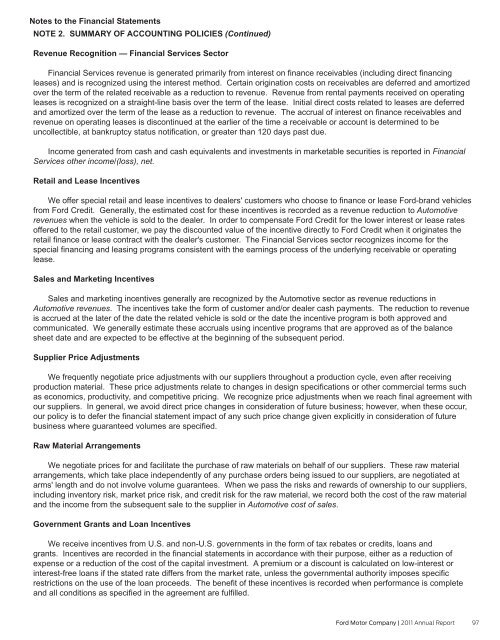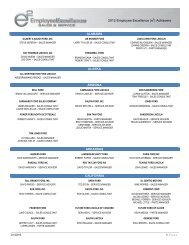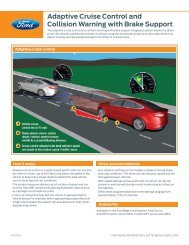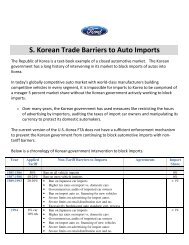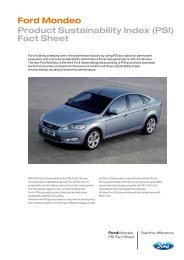Annual Report 2011 - Ford Motor Company
Annual Report 2011 - Ford Motor Company
Annual Report 2011 - Ford Motor Company
Create successful ePaper yourself
Turn your PDF publications into a flip-book with our unique Google optimized e-Paper software.
Notes to the Financial Statements<br />
NOTE 2. SUMMARY OF ACCOUNTING POLICIES (Continued)<br />
Revenue Recognition — Financial Services Sector<br />
Financial Services revenue is generated primarily from interest on finance receivables (including direct financing<br />
leases) and is recognized using the interest method. Certain origination costs on receivables are deferred and amortized<br />
over the term of the related receivable as a reduction to revenue. Revenue from rental payments received on operating<br />
leases is recognized on a straight-line basis over the term of the lease. Initial direct costs related to leases are deferred<br />
and amortized over the term of the lease as a reduction to revenue. The accrual of interest on finance receivables and<br />
revenue on operating leases is discontinued at the earlier of the time a receivable or account is determined to be<br />
uncollectible, at bankruptcy status notification, or greater than 120 days past due.<br />
Income generated from cash and cash equivalents and investments in marketable securities is reported in Financial<br />
Services other income/(loss), net.<br />
Retail and Lease Incentives<br />
We offer special retail and lease incentives to dealers' customers who choose to finance or lease <strong>Ford</strong>-brand vehicles<br />
from <strong>Ford</strong> Credit. Generally, the estimated cost for these incentives is recorded as a revenue reduction to Automotive<br />
revenues when the vehicle is sold to the dealer. In order to compensate <strong>Ford</strong> Credit for the lower interest or lease rates<br />
offered to the retail customer, we pay the discounted value of the incentive directly to <strong>Ford</strong> Credit when it originates the<br />
retail finance or lease contract with the dealer's customer. The Financial Services sector recognizes income for the<br />
special financing and leasing programs consistent with the earnings process of the underlying receivable or operating<br />
lease.<br />
Sales and Marketing Incentives<br />
Sales and marketing incentives generally are recognized by the Automotive sector as revenue reductions in<br />
Automotive revenues. The incentives take the form of customer and/or dealer cash payments. The reduction to revenue<br />
is accrued at the later of the date the related vehicle is sold or the date the incentive program is both approved and<br />
communicated. We generally estimate these accruals using incentive programs that are approved as of the balance<br />
sheet date and are expected to be effective at the beginning of the subsequent period.<br />
Supplier Price Adjustments<br />
We frequently negotiate price adjustments with our suppliers throughout a production cycle, even after receiving<br />
production material. These price adjustments relate to changes in design specifications or other commercial terms such<br />
as economics, productivity, and competitive pricing. We recognize price adjustments when we reach final agreement with<br />
our suppliers. In general, we avoid direct price changes in consideration of future business; however, when these occur,<br />
our policy is to defer the financial statement impact of any such price change given explicitly in consideration of future<br />
business where guaranteed volumes are specified.<br />
Raw Material Arrangements<br />
We negotiate prices for and facilitate the purchase of raw materials on behalf of our suppliers. These raw material<br />
arrangements, which take place independently of any purchase orders being issued to our suppliers, are negotiated at<br />
arms' length and do not involve volume guarantees. When we pass the risks and rewards of ownership to our suppliers,<br />
including inventory risk, market price risk, and credit risk for the raw material, we record both the cost of the raw material<br />
and the income from the subsequent sale to the supplier in Automotive cost of sales.<br />
Government Grants and Loan Incentives<br />
We receive incentives from U.S. and non-U.S. governments in the form of tax rebates or credits, loans and<br />
grants. Incentives are recorded in the financial statements in accordance with their purpose, either as a reduction of<br />
expense or a reduction of the cost of the capital investment. A premium or a discount is calculated on low-interest or<br />
interest-free loans if the stated rate differs from the market rate, unless the governmental authority imposes specific<br />
restrictions on the use of the loan proceeds. The benefit of these incentives is recorded when performance is complete<br />
and all conditions as specified in the agreement are fulfilled.<br />
<strong>Ford</strong> <strong>Motor</strong> <strong>Company</strong> | <strong>2011</strong> <strong>Annual</strong> <strong>Report</strong> 97


